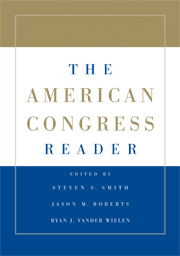Book contents
- Frontmatter
- Contents
- THE AMERICAN CONGRESS READER
- PART I THE AMERICAN CONGRESS: MODERN TRENDS
- PART II REPRESENTATION AND LAWMAKING IN CONGRESS: THE CONSTITUTIONAL AND HISTORICAL CONTEXT
- PART III CONGRESSIONAL ELECTIONS AND POLICY ALIGNMENTS
- PART IV MEMBERS, GOALS, RESOURCES, AND STRATEGIES
- PART V PARTIES AND LEADERS
- PART VI THE STANDING COMMITTEES
- PART VII THE RULES OF THE LEGISLATIVE GAME
- PART VIII THE FLOOR AND VOTING
- PART IX CONGRESS AND THE PRESIDENT
- 28 Presidential Veto Messages
- 29 Presidential Signing Statement
- 30 Veto Bargaining
- 31 The Dynamics of Legislative Gridlock, 1947–1996
- 32 The Politics of Shared Power
- 33 Conscience of a Conservative
- PART X CONGRESS AND THE COURTS
- PART XI CONGRESS, LOBBYISTS, AND INTEREST GROUPS
- PART XII CONGRESS AND BUDGET POLITICS
- PART XIII FURTHER READINGS ON CONGRESSIONAL POLITICS
30 - Veto Bargaining
Presidents and the Politics of Negative Power
Published online by Cambridge University Press: 05 June 2012
- Frontmatter
- Contents
- THE AMERICAN CONGRESS READER
- PART I THE AMERICAN CONGRESS: MODERN TRENDS
- PART II REPRESENTATION AND LAWMAKING IN CONGRESS: THE CONSTITUTIONAL AND HISTORICAL CONTEXT
- PART III CONGRESSIONAL ELECTIONS AND POLICY ALIGNMENTS
- PART IV MEMBERS, GOALS, RESOURCES, AND STRATEGIES
- PART V PARTIES AND LEADERS
- PART VI THE STANDING COMMITTEES
- PART VII THE RULES OF THE LEGISLATIVE GAME
- PART VIII THE FLOOR AND VOTING
- PART IX CONGRESS AND THE PRESIDENT
- 28 Presidential Veto Messages
- 29 Presidential Signing Statement
- 30 Veto Bargaining
- 31 The Dynamics of Legislative Gridlock, 1947–1996
- 32 The Politics of Shared Power
- 33 Conscience of a Conservative
- PART X CONGRESS AND THE COURTS
- PART XI CONGRESS, LOBBYISTS, AND INTEREST GROUPS
- PART XII CONGRESS AND BUDGET POLITICS
- PART XIII FURTHER READINGS ON CONGRESSIONAL POLITICS
Summary
Cameron examines the role of the presidential veto in the legislative process. He contends that the veto, while sparingly used, provides the president with a powerful tool for influencing legislative outcomes. Cameron develops and tests a theoretical framework in which Congress and the president bargain over policy and finds that the veto empowers the president with the ability to extract policy concessions from Congress.
INTERBRANCH BARGAINING
The separation-of-powers system was explicitly predicated on the notion of internal balance and dynamic tension among the three branches. What passes for governance in the American system is often the product of pulling and hauling, haggling and bargaining among the three branches. Though this cliché can be found in any textbook on American government, it is only recently that political scientists have placed interbranch bargaining at the center of theories of American politics.
I study a particular kind of interbranch bargaining, one in which the president looms large: veto bargaining. I study which bills get vetoed, what happens to bills after they are vetoed, how presidents use vetoes and veto threats to wrest policy concessions from Congress, and their success and failure in doing so. I also study the depressing effect of the veto power on Congress's legislative productivity. In other words, I study the president and the politics of “negative power” – the consequences of an institutionalized ability to say no. The research I report is often the first systematic empirical evidence on these matters.
- Type
- Chapter
- Information
- The American Congress Reader , pp. 324 - 342Publisher: Cambridge University PressPrint publication year: 2008



